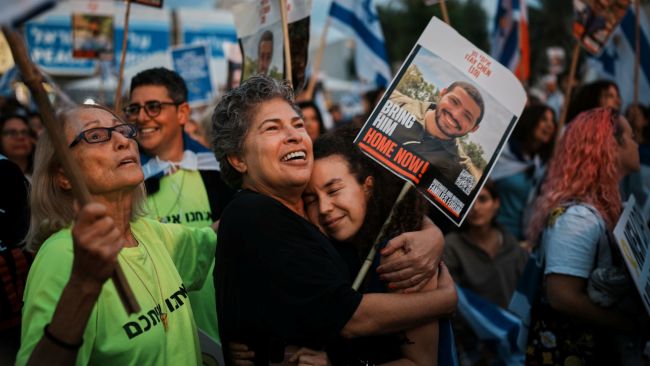Gaza Ceasefire: Red Cross Begins Multi-Phase Hostage and Prisoner Release as Fragile Truce Holds

In a rare moment of fragile hope amid the ruins of Gaza, the International Committee of the Red Cross (ICRC) has confirmed the start of a multi-phase humanitarian operation to oversee the release of hostages and prisoners under the latest Israel–Hamas ceasefire accord.
The Geneva-based organization, which has long served as a neutral humanitarian intermediary in war zones, said it had begun transferring hostages from the Gaza Strip to Israeli authorities, while simultaneously supervising the release of Palestinian prisoners to the West Bank and Gaza.
“The Red Cross will also facilitate the dignified transfer of the deceased, allowing families to bury their loved ones with respect,” the ICRC said in a statement Monday morning.
The operation marks one of the most complex humanitarian exchanges since the onset of the Israel–Hamas conflict two years ago. It is being hailed as a turning point—but also as a test of political will, accountability, and humanitarian integrity in one of the world’s most volatile regions.
A Painful Homecoming: Hope and Heartbreak in Israel and Gaza
In Israel, families gathered in anticipation and mourning — 20 living hostages were expected to be released, while the remains of others will return for burial. Across the border, Palestinians prepared for the release of hundreds of prisoners, many of whom had been detained for years without trial.
The exchange has revived emotions of relief, grief, and anger, as the cost of the war remains painfully high on both sides.
“It’s very emotional,” said one Israeli father whose daughter had been held in Gaza since 2023. “We prayed for this day, but it’s hard to celebrate knowing so many didn’t make it home.”
The Red Cross convoys, marked by their emblem of neutrality, moved discreetly through Gaza and Israel under intense security, symbolizing the delicate balance between humanitarian neutrality and political fragility.
The Mechanics of Mercy: How the Multi-Phase Exchange Works
Under the arrangement brokered with U.S. and regional mediation, Hamas released a list of 20 living hostages — mostly Israeli citizens — to be handed over to the Red Cross.
Simultaneously, Israel released a roster of over 1,900 Palestinian prisoners, including 250 serving life terms for attacks on Israelis and another 1,700 held under administrative detention.
The Red Cross teams are responsible for verifying identities, ensuring humane treatment during transfers, and facilitating communication with families awaiting reunion or closure.
According to Gal Hirsch, Israel’s coordinator for hostages and missing persons, the remains of up to 28 additional hostages are still being located, with an international task force now working under a 72-hour humanitarian window.
Trump’s Return to the Region: A Diplomatic Encore
Adding political weight to the moment, former U.S. President Donald Trump arrived in the region Monday, ahead of a scheduled “peace summit” in Egypt.
The U.S. delegation, including Vice President JD Vance, is meeting with Israeli and Arab leaders to discuss postwar stabilization, humanitarian aid, and the rebuilding of Gaza.
“The war is over,” Trump declared before departing Washington. “This ceasefire will hold — and it must.”
His comments came as humanitarian agencies ramped up deliveries of food, medicine, and shelter materials into Gaza, where 90% of the population has been displaced and much of the territory has been reduced to rubble.
A Fragile Truce and Unanswered Questions
While the release marks a humanitarian breakthrough, analysts warn that the ceasefire remains deeply fragile.
Questions linger about who will govern postwar Gaza, how Hamas will respond to demands for disarmament, and what role the Palestinian Authority will play amid Israel’s political divisions.
Under the U.S.-proposed roadmap, Gaza’s day-to-day governance will be overseen by Palestinian technocrats, under an international security force drawn from Egypt, Jordan, and Arab partners.
The framework also envisions eventual steps toward a two-state solution—a proposal Israeli Prime Minister Benjamin Netanyahu has publicly rejected.
“This is a truce, not a peace,” said Tom Fletcher, the U.N. humanitarian chief. “Gaza remains a wasteland. What happens next will define whether this was a pause for humanity—or merely a pause for politics.”
Humanitarian Stakes: The Cost of Two Years of War
The Israel–Hamas war, which began with Hamas’s surprise October 2023 assault that killed 1,200 people and saw 250 hostages taken, has left Gaza devastated.
According to Gaza’s Health Ministry, over 67,000 Palestinians have been killed, about half of them women and children. The U.N. estimates that nearly 2 million people—90% of Gaza’s population—are displaced.
Israel’s offensive, launched in response to Hamas’s attacks, has flattened neighborhoods, destroyed hospitals, and crippled the enclave’s water and power systems.
Despite criticism, Israeli officials insist their operations targeted militants, not civilians, while Hamas accuses Israel of war crimes and collective punishment.
The Red Cross and the Politics of Neutrality
For the International Committee of the Red Cross, this latest mission reinforces its historic mandate — to remain neutral yet indispensable in times of war.
ICRC operations in Gaza have faced unprecedented challenges, from restricted access to staff endangerment. Yet, humanitarian agencies stress that without its mediation, hostage releases and prisoner swaps of this magnitude would be nearly impossible.
“Our role is humanitarian, not political,” said a senior ICRC representative in Jerusalem. “We are here to protect human dignity, even in the darkest hours.”
The Path Forward: Between Ceasefire and Peace
As humanitarian trucks roll into Gaza and the Red Cross convoys shuttle between despair and relief, the international community faces a daunting task — turning ceasefire into peace.
For now, the exchanges offer a symbolic reprieve and a reminder that even in war, human compassion endures.
But lasting peace, analysts warn, will depend not only on hostage releases or diplomatic handshakes, but on justice, accountability, and reconstruction in a land exhausted by decades of conflict.
“Ceasefires end wars,” said a European diplomat. “But only truth and reconciliation end hatred.”











